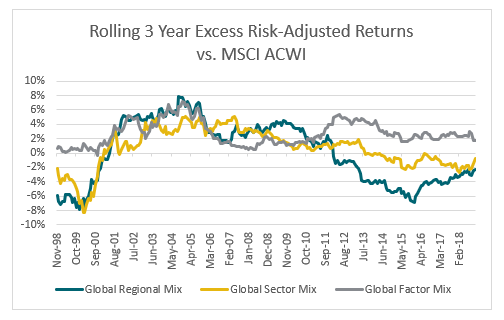While reviewing full periods of risk-adjusted performance can be important, the same view holds up on rolling three-year periods. When compared to other asset allocation approaches, an equal-weighted mix of factors delivers, on average, positive excess risk-adjusted returns over time more consistently than an equal-weighted region or sector portfolio.

Sources: Morningstar Direct, MSCI, and FTSE/Russell. MSCI ACWI GICS Sectors, Russell 3000, MSCI EAFE, MSCI Emerging Markets, and MSCI ACWI Factor indexes used in analysis. Data is based on gross returns from December 1995 through November 2018.
Bottom Line
Advisors should consider using a factor-based asset allocation as it can lead to more consistent outcomes on a risk-adjusted basis than traditional approaches. Factors can allow advisors to tap into deeper levels of diversification, which can be helpful as they emphasize properly measuring and managing risk and returns in portfolios. Ultimately, factors and ETFs that emphasize factors can help advisors tackle common challenges in asset allocation decisions.
This information is prepared for general information only. Information contained herein is derived from sources we believe to be reliable, however, we do not represent that this information is complete or accurate and it should not be relied upon as such. All opinions expressed herein are subject to change without notice. The graphs and charts contained in this work are for informational purposes only. No graph or chart should be regarded as a guide to investing. 2198-CLS-12/26/2018
Joe Smith, CFA, is a Senior Market Strategist at CLS Investments, a participant in the ETF Strategist Channel.

